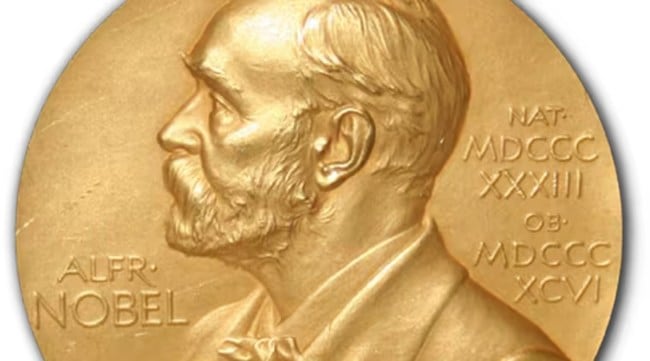Opinion The Nobel Prize has been a Eurocentric, White enterprise. It needs to re-invent
In the age of increasing demand for inclusivity, an award which claims to represent the best of the best needs to be less opaque, more open
 The first and most crucial change the Nobel Foundation must execute is to make that nomination process public. Currently, the nominators and nominees are shrouded in secrecy, both lists unveiled only 50 years after announcing the winner. (File)
The first and most crucial change the Nobel Foundation must execute is to make that nomination process public. Currently, the nominators and nominees are shrouded in secrecy, both lists unveiled only 50 years after announcing the winner. (File) When French writer Jean-Paul Sartre received the Nobel Prize for Literature in 1964, he became one of the only two individuals in history to refuse the award. Justifying his decision, Sartre said that he didn’t want his readers to be influenced by his association to a global institution: “If I sign myself Jean-Paul Sartre, it is not the same thing as if I sign myself Jean-Paul Sartre, Nobel Prize winner.”
The rejection made headlines but the Nobel Prize, established in 1901, has always had an embattled history. Being accused of anti-American and anti-Russian bias in its literary prize, of awarding the peace prize to individuals accused of genocide and massacres, of ignoring the collaborative effort inherent to science by awarding exactly three individuals each year – apart from an overall Eurocentric White male bias, it has never been a stranger to controversies. As this year’s literary prize committee chairperson Anders Olsson once remarked, perhaps wryly, “We always get criticism.”
A similar posture of helpless sincerity was propped by the Nobel Foundation’s board of directors vice-chairman Goran Hansson in 2019 when questioned on lack of gender and racial diversity in the prize’s history. Citing the recent inclusion of more women and minorities nominating winners, he said that diversity and all is important but what really matters is an individual’s level of technical or artistic achievement. The implication is clear: Giving the prize to someone because of their race or gender undermines the prize.
Of course it does. That’s why nobody is asking for it. What critics, since the middle of the 20th century, have argued for is a series of simple measures to ensure more transparency in the Nobel Foundation’s nomination process. To begin with, let’s look at some numbers which necessitate it. Of the 141 peace laureates till date, only 19 have been women; of 119 literature laureates, only 17; of 227 medicine laureates, only 13; of 192 chemistry laureates, only eight; of 224 physics laureates, only four; of 93 economics laureates, only three.
Hansson’s defence that women have only recently been allowed into STEM fields so their contributions will take time to reflect in the awards is partly valid – less than 30 per cent of researchers in the world are women, according to a 2019 UNESCO report. But the Nobel Prize tends to go to tenured professors, and few tenured professorships in even diverse American colleges go to women and minorities, according to a 2016 study. The American National Institute of Health concluded in 2019 that it has historically scored research topics by Black scientists lower than White scientists, according them less funding. According to the American Institute of Physics, women now earn 20 per cent of bachelor’s degress and 18 per cent PhDs in physics, an increase by more than 10 per cent points since 1975, but that proportion remains woefully absent in the physics prize. The American National Science Foundation found in a 2014 study that women make up more than half of the jobs in psychology and social sciences now. Notwithstanding many studies documenting a citation gap — men tend to cite men — societal changes have surpassed the Nobel’s affirmative actions. If the Foundation has indeed added more women to the nomination process, how many, from which regions, from which universities? These numbers are missing.
The first and most crucial change the Nobel Foundation must execute is to make that nomination process public. Currently, the nominators and nominees are shrouded in secrecy, both lists unveiled only 50 years after announcing the winner. An award which claims to represent the best of the best without even revealing who was considered – in the age of online mobilisation and unrelenting demands for inclusivity – is not only in bad taste, but a horrible PR move.
Secondly, the archives of past nominees and nominations must be revealed. The diversity numbers will receive much-needed context. After her relevant period of secrecy was over, Austrian physicist Lise Meitner was found to have been nominated 48 times without ever winning. The first African-American to win a Nobel Prize was political scientist Ralph Bunche, in 1950, four decades after the inception of the prize – only 16 more Black people have followed him since. Asians have fared slightly better – totalling 77 wins across fields – but form a meagre eight per cent of the total 965 laureates.
Thirdly, listen to the overwhelming demand of the scientific community and break convention to only award the medicine, physics and chemistry prizes to a trio of individuals. The economics and peace prizes go to organisations — why can’t science? The 2008 physics prize drew widespread condemnation when three scientists won for discovering the Higgs boson particle, despite their scientific papers listing so many names they ran into 15 pages. Underlining the international, thousand individuals-strong collaborations that accompany scientific discoveries and inventions today, journal Scientific American argues, “Whereas a century ago a patent clerk famously divined the theory of relativity in his spare time, discovering a Higgs boson requires decades of planning and the efforts of 6,000 researchers. No one person — no troika, even — can legitimately claim all the credit.”
Years after rejecting the Nobel, Sartre joked that the “bourgeois establishment” of the Nobel Prize wanted to “cover up” his anti-colonial and Marxist activism by giving him a prize. Today, Sartre isn’t around, but the Foundation should make haste before more come around.





